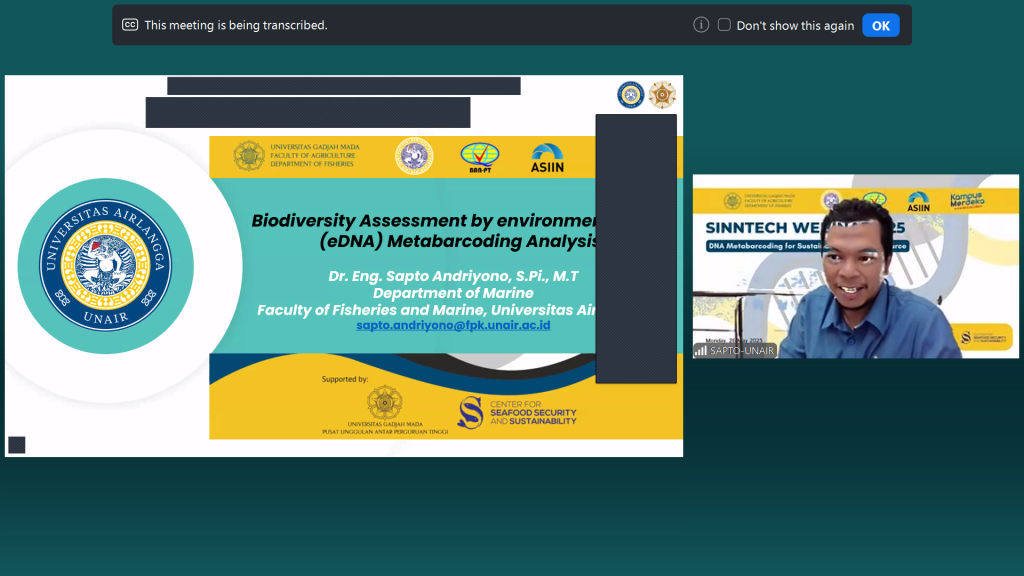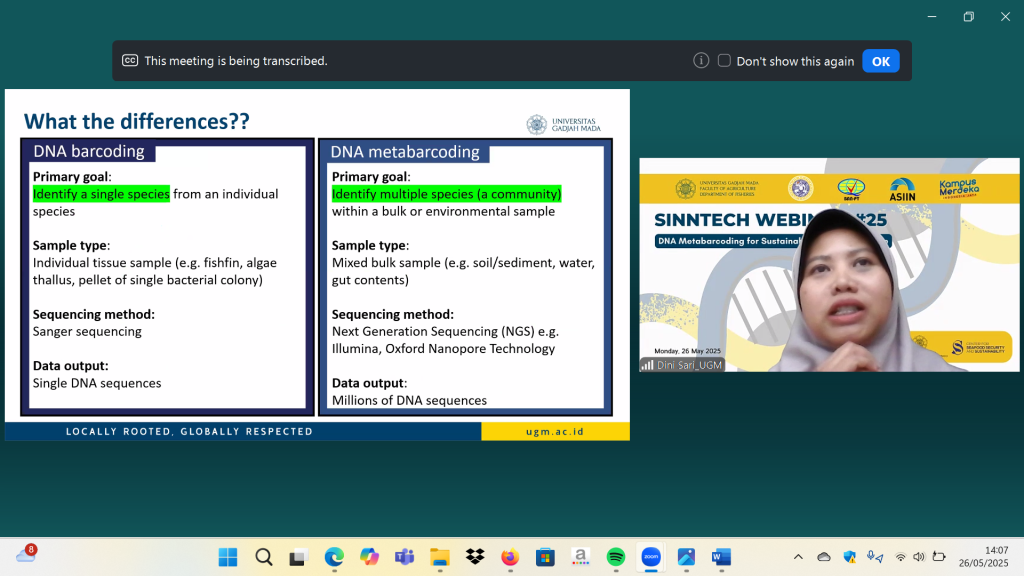The Master’s Program in Fisheries Science, Faculty of Agriculture, Universitas Gadjah Mada (UGM) once again held the SINNTECH Webinar #25 as a platform for scientific enrichment for the academic community and the general public. This online event was conducted on Monday, May 26, 2025, with the theme “DNA Metabarcoding for Sustainable Aquatic Resource.” The webinar featured two expert speakers who shared the latest insights on the application of DNA metabarcoding technology in the fields of fisheries and marine science. The session was moderated by Dr. Sulistiowati, S.Si., M.Si., a lecturer from the Department of Fisheries, Faculty of Agriculture, UGM, who guided the discussion in a dynamic and interactive manner.
The event was attended by participants from diverse backgrounds, including students, lecturers, researchers, and fisheries practitioners from both within and outside the institution. The webinar aimed to broaden participants’ understanding of genetic methods for aquatic organism identification to support the sustainable management of biological resources. The chosen theme aligns with the commitment of the Master’s Program in Fisheries Science at UGM to address global challenges in the fisheries sector.
The first speaker, Dr. Eng. Sapto Andriyono, S.Pi., M.T., from the Department of Marine Science, Faculty of Fisheries and Marine Sciences, Universitas Airlangga, delivered a presentation titled “Biodiversity Assessment by eDNA Metabarcoding Analysis.” In his presentation, he explained that the use of environmental DNA (eDNA) represents a revolutionary approach to biodiversity identification in aquatic environments. This technique enables species detection using only water samples, eliminating the need for direct organism capture—making it more environmentally friendly and efficient. Dr. Sapto also highlighted the importance of developing a comprehensive genetic database to ensure the accuracy of eDNA analysis results. The application of this method is considered highly promising for sustainable ecosystem monitoring, particularly in conservation areas and coastal zones vulnerable to ecological disturbances. He also shared research experiences conducted in several Indonesian waters, which demonstrated the ability of eDNA to rapidly detect rare or invasive species. His presentation offered a comprehensive overview of future research and development opportunities in this field.

The second speaker, Dr. Dini Wahyu Kartika Sari, S.Pi., M.Si., from the Department of Fisheries, Faculty of Agriculture, Universitas Gadjah Mada, presented a topic entitled “Metabarcoding of Giant Gourami Intestinal Microflora.” She discussed how DNA metabarcoding methods are applied to identify microbial communities in the digestive tract of the giant gourami (Osphronemus goramy), one of Indonesia’s leading aquaculture commodities. The research aimed to understand the intestinal microbiota profile, which plays a key role in digestion, growth, and fish health. Dr. Dini explained that this information could be used to develop more targeted and environmentally friendly probiotic strategies. Metabarcoding allows for the identification of large numbers of microbes with high resolution, opening up opportunities for innovation in nutrigenomics and fish health management. The study revealed variations in microflora based on feed and culture environment conditions. The discussion of gut microbiota provided a new perspective for developing aquaculture based on molecular approaches.

The webinar was well-received by participants, who actively engaged in the Q&A session, reflecting strong interest in the application of DNA technology in fisheries. The presence of these two competent speakers provided new insights into the use of DNA metabarcoding as a tool for informing aquatic resource management policies. The discussion was lively, especially regarding the challenges of implementing this method in the field, including laboratory availability, genetic databases, and the need for skilled human resources. Dr. Sulistiowati, as the moderator, also emphasized the importance of collaboration between research and educational institutions in advancing the broader application of eDNA and metabarcoding. This webinar is expected to be a starting point for strengthening multidisciplinary research that integrates molecular science, ecology, and aquaculture.
The implementation of SINNTECH Webinar #25 is part of the commitment of the Master’s Program in Fisheries Science at UGM to continuously foster innovation and evidence-based science. Through this event, participants are expected to gain applicable and inspiring knowledge for sustainable fisheries management. This activity aligns with several Sustainable Development Goals (SDGs): Goal 4 – Quality Education, Goal 14 – Life Below Water, and Goal 17 – Partnerships for the Goals.
Writer: Rafi Sukma Aulia
Editor: Dr. Mukti Aprian, S.Kel., M.Si. (Han)


